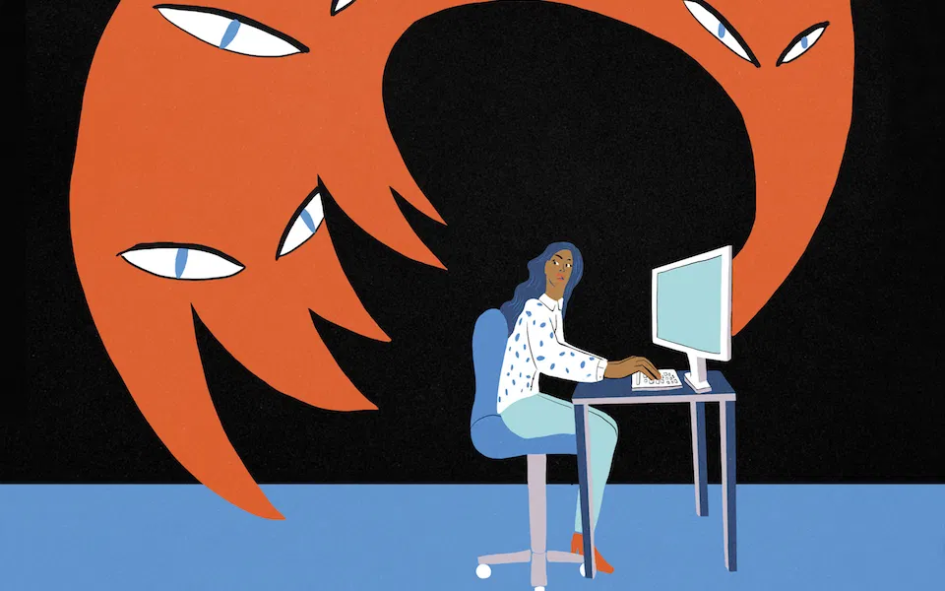By Maham Abbasi, Copy Edited by Adam Rizvi, TIO :
‘Sexual harassment’ is any form of unwelcome sexual behavior that’s offensive, humiliating, or intimidating. Most importantly, it’s against the law. Being sexually harassed affects people in different ways. It can be written, verbal or physical, and can happen in person or online. Both men and women can be the victims of sexual harassment. Sexual harassment at the workplace is a deeply rooted problem in the world whether it is a developed nation or a developing one. Atrocities against women are common everywhere. It is often seen how women are usually targeted in society, they face sexual harassment more than their male counterparts. With laws and media consistently focussing on protecting, preventing and prohibiting or even give remedies, such violation always takes place.
It is a crime against women majorly because they are the most vulnerable in our society.

As per experts, working women complain of ‘online’ sexual harassment during the COVID-19 lockdown and have approached the experts for guidance as they were unaware of how to raise complaints of sexual harassment while working from home and this was taking a toll on their mental health and well being.
Women are regularly subjected to online rape threats, online harassment, cyberstalking, blackmail, and more.
As the internet becomes an increasingly important part of human existence and a critical space for marginalized populations to make their voices heard, more during a global pandemic, a woman’s inability to feel safe online hampers her freedom and basic human rights. Also, online, it only magnifies. Yet the problem of online violence and harassment is overlooked in discussions of violence against women.
“There are no clear guidelines by companies on how work from home should function in an organisation and that confuses women. I have been receiving 4-5 such complaints of harassment everyday ever since the lockdown was imposed,” said Akancha Srivastava, last month, who runs the foundation Akancha Against Harassment, India”s largest social impact against cyber harassment initiative.
However, the number of complaints received by the National Commission for Women (NCW) has been low since the lockdown began but the experts say that could be because many women do not want to officially complain and wish to consult what they can do in the matter.
“During the lockdown, many women are worried about their job security so they are not sure if they should speak up or not. The women have the constant dilemma that they should not be looked upon as troublemakers,” Srivastava said.
She said work from home means there are going to be some disruptions and that one must respectfully accept but that is not happening and it is causing even more stress to women.
“They are made to feel guilty of any home responsibility they might have and women are being demanded to come online at odd hours they are being talked down if the environment is not to their liking. These are very subtle ways of sexually harassing women,” she said.
Giving examples, Srivastava said one woman had recently received a video call request from her boss at 11 pm for an “urgent matter”, but when she received the call it turned out to be for something that on a regular day would have been easily taken care of over an email.
Weird dressing sense during video calls and meetings, odd calling hours, putting up with extra stress of work along with unwelcoming behaviour from the male counterparts are all sorts of problems women are facing everyday. Some experts working on the field also pointed out about the many times that it has been seen people not realising that there are women on the call as well, intentionally or unintentionally and pass inappropriate comments.
It is always advised to raise the concern then and there on the call so it does not happen again, if that makes you uncomfortable then discuss it with the head of the team or raise it via the organisation’s reporting channel.

Every organisation has a set of policies on harassment. There is a proper council that addresses all these concerns. Women can anonymously report the concerns. The council discusses the same with the concerned person and address it on time, mostly resolving and trying to put an end to it.
The last call if nothing works out is to report local concerned authorities and inform them the whole story.
We have to talk about it and talk it out loud for it to stop, which seems like a long battle but it can be won, only if we speak up.
courtesy India Observer

Leave a Reply